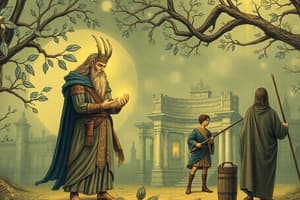Podcast
Questions and Answers
What is the primary theme explored in the epic poem 'Beowulf'?
What is the primary theme explored in the epic poem 'Beowulf'?
- Religious faith
- The struggle for power
- The transience of life
- Heroism and loyalty (correct)
Which genre is NOT typically associated with Anglo-Saxon literature?
Which genre is NOT typically associated with Anglo-Saxon literature?
- Epic poetry
- Elegies
- Historical prose
- Romantic novels (correct)
Which work is a collection of annals detailing the history of the Anglo-Saxons?
Which work is a collection of annals detailing the history of the Anglo-Saxons?
- The Exeter Book
- Caedmon's Hymn
- Beowulf
- The Anglo-Saxon Chronicle (correct)
What literary device is commonly found in Anglo-Saxon poetry, exemplified by terms like 'whale-road'?
What literary device is commonly found in Anglo-Saxon poetry, exemplified by terms like 'whale-road'?
What kept many Anglo-Saxon texts preserved despite historical destruction?
What kept many Anglo-Saxon texts preserved despite historical destruction?
Flashcards are hidden until you start studying
Study Notes
Anglo-Saxon Literature
-
Time Period:
- Roughly 450 AD to 1066 AD, encompassing Old English literature.
-
Language:
- Written in Old English, a Germanic language that evolved into Middle English.
-
Genres:
- Epic poetry
- Religious texts
- Elegies
- Prose (historical, legal, and didactic)
-
Key Works:
-
Beowulf:
- An epic poem, considered the most important work of Anglo-Saxon literature.
- Focuses on the hero Beowulf, his battles against Grendel, Grendel’s mother, and a dragon.
- Explores themes of heroism, loyalty, and mortality.
-
The Anglo-Saxon Chronicle:
- A collection of annals detailing the history of the Anglo-Saxons.
- Compiled in the late 9th century, reflects political events and culture.
-
The Exeter Book:
- A 10th-century anthology of Anglo-Saxon poetry.
- Contains religious and secular poems, riddles, and elegies, such as "The Wanderer" and "The Seafarer."
-
Caedmon’s Hymn:
- An early example of Old English poetry attributed to Caedmon, a shepherd.
- A religious poem praising God, notable for its theological themes.
-
-
Themes:
- Heroism and valor
- The struggle between good and evil
- Fate and the influence of destiny
- The transience of life and the inevitability of death
- Religious faith and morality
-
Style and Form:
- Use of alliteration and strong rhythm.
- Typically composed in unrhymed lines.
- Kenning: A compound expression with metaphorical meaning (e.g., "whale-road" for sea).
-
Cultural Influence:
- Reflects the values of Anglo-Saxon society, including loyalty, honor, and bravery.
- Impact on later English literature, contributing to the development of narrative style and poetic forms.
-
Preservation:
- Many texts survived through monastic copies, despite destruction during the Norman Conquest and Viking invasions.
Time Period and Language
- Anglo-Saxon literature spans from approximately 450 AD to 1066 AD.
- Written in Old English, a Germanic language that gradually transitioned to Middle English.
Genres
- Primary genres include:
- Epic poetry
- Religious texts
- Elegies
- Prose works such as historical, legal, and didactic writings.
Key Works
-
Beowulf:
- Epic poem, paramount in Anglo-Saxon literature.
- Follows hero Beowulf’s battles against Grendel, Grendel's mother, and a dragon.
- Themes include heroism, loyalty, and mortality.
-
The Anglo-Saxon Chronicle:
- A comprehensive collection of annals detailing Anglo-Saxon history.
- Compiled in the late 9th century, reflecting the era’s political events and cultural context.
-
The Exeter Book:
- A 10th-century anthology featuring religious and secular poetry.
- Includes notable poems and riddles, such as "The Wanderer" and "The Seafarer."
-
Caedmon’s Hymn:
- One of the earliest examples of Old English poetry, attributed to a shepherd named Caedmon.
- A religious piece that praises God, with significant theological themes.
Themes
- Recurring themes in Anglo-Saxon literature:
- Valor and heroism
- Good vs. evil struggles
- Fate and destiny's influence
- Life's transience and death's inevitability
- Religious faith and moral considerations.
Style and Form
- Characterized by strong rhythm and use of alliteration.
- Generally features unrhymed lines.
- Kenning: a compound expression used metaphorically (e.g., "whale-road" for sea).
Cultural Influence
- Reflects societal values, such as loyalty, honor, and bravery, of the Anglo-Saxon era.
- Influential in shaping later English literature, particularly narrative styles and poetic forms.
Preservation
- Many works have survived due to copies made by monastic scribes.
- Survival challenged by destruction during the Norman Conquest and Viking invasions.
Studying That Suits You
Use AI to generate personalized quizzes and flashcards to suit your learning preferences.




